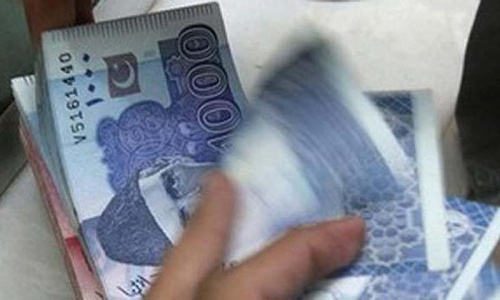IN the absence of facts, rumour is king. Thus, the mysterious disappearance of Malaysian Airlines flight 370 has sent a host of theories rippling through cyberspace. Newspapers, TV and radio are reporting unsubstantiated scenarios and farfetched possibilities.
Everything from extra-terrestrial Unidentified Flying Objects to a leak that depressurised the cockpit and incapacitated the crew is the subject of breathless discussion on the internet.
Another event, closer to home, is the mystery of the falling dollar. When Finance Minister Ishaq Dar vowed to bring the dollar-rupee exchange rate down to under a hundred from close to 110, sceptics sneered. In a column, I asked if Mr Dar was in possession of Harry Potter’s magic wand.
I retract my jibe as it seems our finance minister does indeed have supernatural powers, for lo and behold, the dollar is selling for around a hundred rupees.
Or is he really such a financial wizard? We now learn that the cause of this unexpected windfall is Saudi largesse in the form of 1.5 billion dollars (with another 1.5 billion to follow).
Part of this bounty has gone into flooding the market with dollars. Traders and sharks who had been hoarding greenbacks in the expectation that the rupee would fall further, quickly unloaded their stash of hard currency to cut their losses.
After the initial euphoria, reality made a belated appearance in the shape of tough questions about how this economic miracle had been wrought. Senator Farhatullah Babar demanded that the government disclose the terms under which this Saudi treasure had been obtained. Was the quid pro quo a shift in our policy towards Syria?
Even before the foreign exchange miracle, we had been noting the flurry of visits by Saudi princelings. Equally significant had been the visit of the army chief to Riyadh. When a member of the National Assembly asked the Foreign Office if Pakistan’s foreign policy was being transformed to bring it into line with the Saudi interventionist approach, the official spokeswoman questioned his level of intelligence.
At the risk of having my IQ level mocked by our mandarins, let me ask where we stand on Syria. Hitherto, we have tried to be neutral in inter-Arab disputes, of which there have been more than a few.
This has been a sensible approach as we have little to gain and much to lose by taking sides in these interminable conflicts.
This is far truer of Syria than most other places. Here, a number of regional and global powers are fighting a proxy war that has ripped the country apart, inflicting casualties on a horrendous scale.
The Saudis have been at the forefront of the campaign to bring down the government of Bashar Al Assad almost from the beginning of the uprising against him.
Moved no doubt by their commitment to democracy and human rights, the Saudis have armed some of the most radical Islamists fighting in Syria. Millions of dollars have been handed over, together with increasingly sophisticated arms.
According to the rumour mill, now Pakistan is poised to leap into the fray by sending military trainers, together with portable anti-tank and anti-aircraft missiles.
If this is true, we could be facing a deadly backlash. Iran and Russia have been supporting Bashar Al Assad with cash, weapons and, in Iran’s case, manpower.
Russia has a naval base there, and Iran has deep links with the Alewite leadership. Saudi Arabia is determined to topple Syria’s Shia-led government. In this, Riyadh is on the same page as Israel and the US. Both would like to see Damascus’s support for Hizbollah and Hamas reduced, if not eliminated entirely.
Recently, the Iraqi Prime Minister accused Saudi Arabia of exporting terrorism through its Wahabi/Salafi network. Syria and Iraq — both with Shia leaders — have been devastated by attacks launched by radical Sunni militants.
Thus, if we are indeed taking a pro-Saudi position by sending trainers and arms to further fuel the slaughter in Syria, we should expect a strong response from Iran.
Already, our relationship with our neighbour is prickly due to Tehran’s perception that we are permitting anti-Iran Sunni terrorists to cross over from our side to launch attacks. Indeed, Iran has recently threatened to exercise its right of hot pursuit in order to punish groups like Jundullah.
In Syria, the civil war is now openly a sectarian conflict with villages and city neighbourhoods being subjected to religious cleansing. Recently, the rebels announced that they were holding scores of Alewite villagers, including many women and children hostage to engineer the release of their fighters captured by government forces.
Obviously, this sectarian conflict is going to impact on Shia-Sunni harmony around the Muslim world. In Pakistan, relations between the two communities are already fraught, with Shias being targeted regularly by virulent Sunni jihadis. Occasionally, Shia extremists retaliate against their tormentors.
Sending Pakistani arms that would be used to kill Shias in Syria will inflame an already volatile situation.
Another imponderable in this equation is the possibility of an improvement of Iran’s relations with the Great Satan. If the two sides reach an agreement over Tehran’s nuclear programme, the wedge between Washington and Riyadh will grow, and the Saudis will no longer be indispensable, specially in view of growing American energy independence.
Our leaders would do well to ponder on these factors before they sell our foreign policy to Saudi Arabia.













































